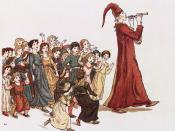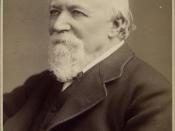In his poem, "Porphyria's Lover", Robert Browning illustrates the narrators need for power by suppressing Porphyria's thoughts and making the decision of her eternal happiness for her. The narrator is threatened by Porphyria's apparently higher social status. Only after taking Porphyria's life is the narrator experiencing the superiority he desires. Porphyria never utters a word within the poem; the reader only learns the view of the narrator. This is another indirect way the narrator is expressing his lack of power and/or male domination over Porphyria.
"That moment she was mine, mine, fair,
Perfectly pure and good: I found
A thing to do, and all her hair
In one long yellow string I wound
Three times her little neck around,
And strangled her. No pain felt she;
I am quite sure she felt no pain".
In the above passage, the narrator is describing in some detail the way he killed Porphyria.
He uses a repetition of the word "mine" in the first line, which could be lead to believe that this is another dominating point. Emphasizing the word "mine" is almost what a child will say about sharing a toy. Even before he kills Porphyria, the narrator is showing what is almost an obsession with Porphyria being his possession, not necessarily his lover. The narrator has begun to smother her with his thoughts before he actually kills her. The narrator is convincing himself that Prophyria is, at that moment, all his and wants to freeze that moment forever. The narrator is feeling extreme power at this point because he takes on the role of God. God is a very powerful and praised figure. For the narrator to believe he has that power, for example killing Porphyria, he is feeling an intense dominance. This feeling of dominance is not only...


